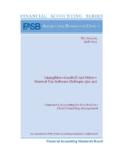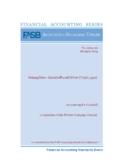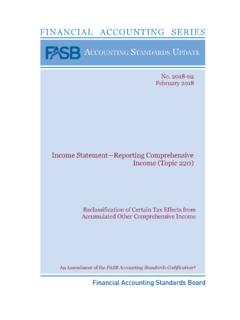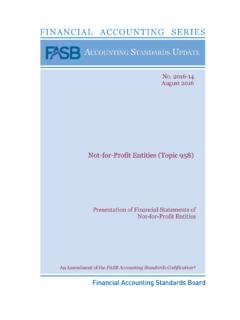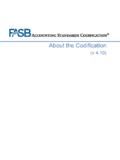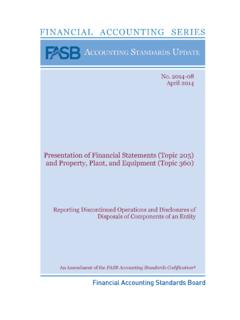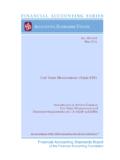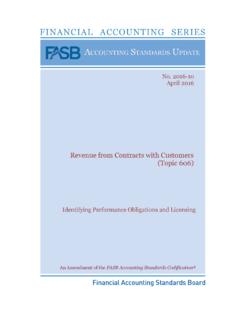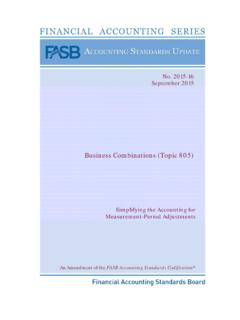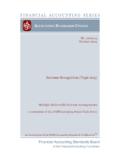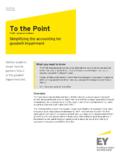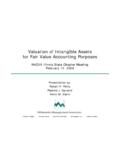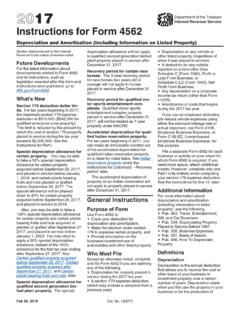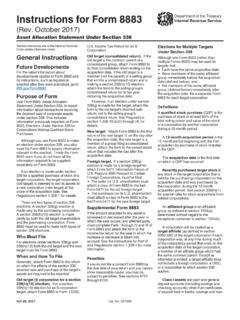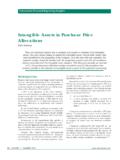Transcription of Accounting Standards Update 2016-19 - FASB
1 No. 2016 -19. December 2016 . Technical Corrections and Improvements An Amendment of the FASB Accounting Standards Codification . The FASB Accounting Standards Codification is the source of authoritative generally accepted Accounting principles (GAAP) recognized by the FASB to be applied by nongovernmental entities. An Accounting Standards Update is not authoritative; rather, it is a document that communicates how the Accounting Standards Codification is being amended. It also provides other information to help a user of GAAP understand how and why GAAP is changing and when the changes will be effective. For additional copies of this Accounting Standards Update and information on applicable prices and discount rates contact: Order Department Financial Accounting Standards Board 401 Merritt 7. PO Box 5116. Norwalk, CT 06856-5116. Please ask for our Product Code No. ASU2016-19. FINANCIAL Accounting SERIES (ISSN 0885-9051) is published monthly with the exception of April, August, and October by the Financial Accounting Foundation, 401 Merritt 7, PO Box 5116, Norwalk, CT 06856-5116.
2 Periodicals postage paid at Norwalk, CT and at additional mailing offices. The full subscription rate is $255 per year. POSTMASTER: Send address changes to Financial Accounting Standards Board, 401 Merritt 7, PO Box 5116, Norwalk, CT 06856- 5116. | No. 443. Copyright 2016 by Financial Accounting Foundation. All rights reserved. Content copyrighted by Financial Accounting Foundation may not be reproduced, stored in a retrieval system, or transmitted, in any form or by any means, electronic, mechanical, photocopying, recording, or otherwise, without the prior written permission of the Financial Accounting Foundation. Financial Accounting Foundation claims no copyright in any portion hereof that constitutes a work of the United States Government. Accounting Standards Update No. 2016 -19. December 2016 . Technical Corrections and Improvements An Amendment of the FASB Accounting Standards Codification . Financial Accounting Standards Board Accounting Standards Update 2016 -19. Technical Corrections and Improvements December 2016 .
3 CONTENTS. Page Numbers Summary ..1 5. Amendments to the FASB Accounting Standards Codification ..7 117. Background Information and Basis for Conclusions ..118 122. Amendments to the XBRL Taxonomy ..123. Summary Why Is the FASB Issuing This Accounting Standards Update ( Update )? Since the FASB Accounting Standards Codification was established in September 2009 as the source of authoritative generally accepted Accounting principles (GAAP) to be applied by nongovernmental entities, stakeholders have provided suggestions for minor corrections and clarifications. The Accounting Standards Codification's About the Codification describes the FASB's procedure for responding to submissions, which involves the staff analyzing and processing the submissions and including any resulting changes to the Accounting Standards Codification in maintenance updates or in an Accounting Standards Update . The Board has a standing project on its agenda to address suggestions received from stakeholders on the Accounting Standards Codification and to make other incremental improvements to GAAP.
4 This perpetual project will facilitate Accounting Standards Codification updates for technical corrections, clarifications, and minor improvements and should eliminate the need for periodic agenda requests for narrow and incremental items. These amendments are referred to as technical corrections and improvements. The Board decided that the types of issues that it will consider through this project are changes to clarify the Accounting Standards Codification or correct unintended application of guidance that is not expected to have a significant effect on current Accounting practice or create a significant administrative cost to most entities. The amendments in this Update include items raised to the Board through the Accounting Standards Codification's feedback mechanism and are items that met the scope of this project, rather than that of a maintenance Update , making due process necessary. Maintenance updates include nonsubstantive corrections to the Accounting Standards Codification, such as editorial corrections, various types of link-related changes, and changes to source fragment information that is used for the Cross Reference and Printer-Friendly with Sources options of the Accounting Standards Codification.
5 Who Is Affected by the Amendments in This Update ? This Update contains amendments that affect a wide variety of Topics in the Accounting Standards Codification. The amendments in this Update apply to all reporting entities within the scope of the affected Accounting guidance. 1. What Are the Main Provisions? The amendments in this Update cover a wide range of Topics in the Accounting Standards Codification. The reason for each amendment is provided before each of the amendments for clarity and ease of understanding. The amendments generally fall into one of the types of categories listed below. 1. Amendments related to differences between original guidance and the Accounting Standards Codification: These amendments arose because of differences between original guidance (for example, FASB. Statements, Emerging Issues Task Force [EITF] Issues, and so forth) and the Accounting Standards Codification. These amendments principally carry forward pre-Codification guidance or subsequent amendments into the Accounting Standards Codification.
6 Many times, either the writing style or phrasing of the original guidance did not directly translate into the Accounting Standards Codification format and style. As a result, the meaning of the guidance might have been unintentionally altered. Alternatively, amendments in this category may relate to guidance that was codified without some text, reference, or phrasing that, upon review, was deemed important to the guidance. 2. Guidance clarification and reference corrections: These amendments provide clarification through updating wording, correcting references, or a combination of both. In most cases, the feedback suggested that, without these enhancements, guidance may be misapplied. 3. Simplification: These amendments streamline or simplify the Accounting Standards Codification through minor structural changes to headings or minor editing of text to improve the usefulness and understandability of the Accounting Standards Codification. 4. Minor improvements: These amendments improve the guidance and are not expected to have a significant effect on current Accounting practice or create a significant administrative cost to most entities.
7 This Update includes simplification and minor improvements to Topics on insurance and troubled debt restructuring that result in numerous editorial changes to the Accounting Standards Codification. The changes are not expected to affect current Accounting practice or result in any significant costs. The amendments on insurance are intended to simplify and improve the readability of select guidance in Subtopic 715-30, Compensation Retirement Benefits . Defined Benefit Plans Pension, and Subtopic 715-60, Compensation . Retirement Benefits Defined Benefit Plans Other Postretirement, and Topic 944, Financial Services Insurance. Because the guidance was developed over time in these areas, several different but similar terms were used to represent participating insurance. Currently, these Subtopics and Topic use the terms 2. participating contract, participating insurance contract, and participating insurance interchangeably throughout the Accounting Standards Codification. As a result, each Master Glossary term contains minor editorial differences.
8 The amendment in this Update results in consistent use of the term participating insurance throughout the relevant guidance. Similarly, the guidance in Topic 825, Financial Instruments, and Topic 944 use the terms reinsurance receivable and reinsurance recoverable interchangeably. The amendment in this Update uses the term reinsurance recoverable consistently within these two Topics because that is the more commonly used term in the industry. The use of the consistent terms participating insurance and reinsurance recoverable results in clearer, unified guidance and simplifies the Accounting Standards Codification. The amendment in this Update on troubled debt restructuring removes the term debt from the Master Glossary. The current definition was codified from guidance that was specific to troubled debt restructuring. Because of its inclusion in the Master Glossary, the definition might be used by analogy to other Topics that use the term debt but are unrelated to troubled debt restructuring.
9 The Board does not consider the definition of debt used in the troubled debt guidance to be robust enough to be used by analogy or by reference to other Topics. The amendment in this Update restricts the use of the current definition to Subtopic 310-40, Receivables Troubled Debt Restructurings by Creditors, and Subtopic 470-60, Debt Troubled Debt Restructurings by Debtors. How Do the Main Provisions Differ from Current Generally Accepted Accounting Principles (GAAP) and Why Are They an Improvement? The amendments in this Update represent changes to clarify, correct errors, or make minor improvements to the Accounting Standards Codification. The amendments make the Accounting Standards Codification easier to understand and easier to apply by eliminating inconsistencies and providing clarifications. What Are the Transition Requirements and When Will the Amendments Be Effective? Most of the amendments in this Update do not require transition guidance and are effective upon issuance of this Update .
10 Six amendments in this Update clarify guidance or correct references in the Accounting Standards Codification that could potentially result in changes in current practice because of either misapplication or misunderstanding of current 3. guidance. Early adoption is permitted for the amendments that require transition guidance. Those amendments are identified and described as follows: 1. The amendment to Subtopic 350-40, Intangibles Goodwill and Other . Internal-Use Software, adds a reference to guidance to use when Accounting for internal-use software licensed from third parties that is within the scope of Subtopic 350-40. The transition guidance for that amendment is the same as the transition guidance in Accounting Standards Update No. 2015-05, Intangibles Goodwill and Other . Internal-Use Software (Subtopic 350-40): Customer's Accounting for Fees Paid in a Cloud Computing Arrangement, to which the amendment relates. 2. The amendment to Subtopic 360-20, Property, Plant, and Equipment.
